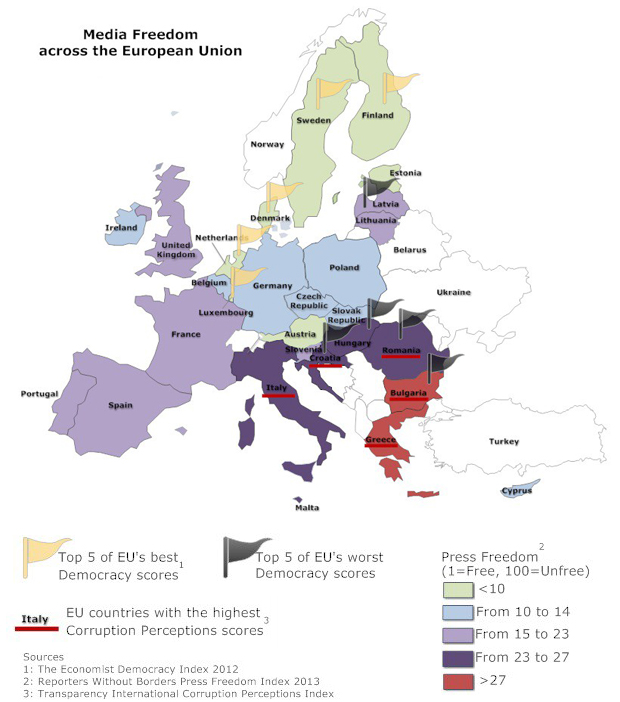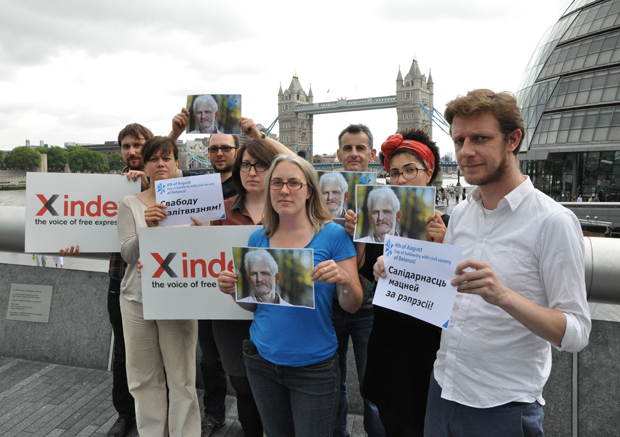12 Mar 2014 | About Index, Digital Freedom
Index on Censorship had a Google Hangout on how to protect yourself from mass surveillance, and what you can do to demand the right to privacy from your government.
Jim Killock, Executive Director at Open Rights Group, Mike Rispoli, Communications Manager at Privacy International, and Mike Harris, Campaign Director for Don’t Spy On Us share their thoughts on the unfolding fight to restrict mass surveillance.
27 Dec 2013 | Digital Freedom, Europe and Central Asia, European Union, News, Politics and Society, Religion and Culture

This article is part of a series based on our report, Time to Step Up: The EU and freedom of expression.
Since the entering into force of the Lisbon Treaty on 1 December 2009, which made the EU Charter of Fundamental Rights legally binding, the EU has gained an important tool to deal with breaches of fundamental rights.
The Lisbon Treaty also laid the foundation for the EU as a whole to accede to the European Convention on Human Rights. Amendments to the Treaty on European Union (TEU) introduced by the Lisbon Treaty (Article 7) gave new powers to the EU to deal with state who breach fundamental rights.
The EU’s accession to the ECHR, which is likely to take place prior to the European elections in June 2014, will help reinforce the power of the ECHR within the EU and in its external policy. Commission lawyers believe that the Lisbon Treaty has made little impact, as the Commission has always been required to assess whether legislation is compatible with the ECHR (through impact assessments and the fundamental rights checklist) and because all EU member states are also signatories to the Convention.[1] Yet external legal experts believe that accession could have a real and significant impact on human rights and freedom of expression internally within the EU as the Court of Justice of the European Union (CJEU) will be able to rule on cases and apply European Court of Human Rights jurisprudence directly. Currently, CJEU cases take approximately one year to process, whereas cases submitted to the ECHR can take up to 12 years. Therefore, it is likely that a larger number of freedom of expression cases will be heard and resolved more quickly at the CJEU, with a potential positive impact on justice and the implementation of rights in the EU.[2]
The Commission will also build upon Council of Europe standards when drafting laws and agreements that apply to the 28 member states. Now that these rights are legally binding and are subject to formal assessment, this may serve to strengthen rights within the Union.[3] For the first time, a Commissioner assumes responsibility for the promotion of fundamental rights; all members of the European Commission must pledge before the Court of Justice of the European Union that they will uphold the Charter.
The Lisbon Treaty also provides for a mechanism that allows European Union institutions to take action, whether there is a clear risk of a “serious breach” or a “serious and persistent breach”, by a member state in their respect for human rights in Article 7 of the Treaty of the European Union. This is an important step forward, which allows for the suspension of voting rights of any government representative found to be in breach of Article 7 at the Council of the European Union. The mechanism is described as a “last resort”, but does potentially provide leverage where states fail to uphold their duty to protect freedom of expression.
Yet within the EU, some remained concerned that the use of Article 7 of the Treaty, while a step forward, is limited in its effectiveness because it is only used as a last resort. Among those who argued this were Commissioner Reding, who called the mechanism the “nuclear option” during a speech addressing the “Copenhagen Dilemma” (the problem of holding states to the human rights commitments they make when they join). In March 2013, in a joint letter sent to Commission President Barroso, the foreign ministers of the Netherlands, Finland, Denmark and Germany called for the creation of a mechanism to safeguard principles such as democracy, human rights and the rule of law. The letter argued there should be an option to cut EU funding for countries that breach their human rights commitments.
It is clear that there is a fair amount of thinking going on internally within the Commission on what to do when member states fail to abide by “European values”. Commission President Barroso raised this in his State of the Union address in September 2012, explicitly calling for “a better developed set of instruments” to deal with threats to these rights.
This thinking has been triggered by recent events in Hungary and Italy, as well as the ongoing issue of corruption in Bulgaria and Romania, which points to a wider problem the EU faces through enlargement: new countries may easily fall short of both their European and international commitments.
Full report PDF: Time to Step Up: The EU and freedom of expression
Footnotes
[1] Off-record interview with a European Commission lawyer, Brussels (February 2013).
[2] Interview with Prof. Andrea Biondi, King’s College London, 22 April 2013.
[3] Interview with lawyer, Brussels (February 2013).
2 Aug 2013 | Campaigns

Index joins the International Day of Solidarity with Civil Society of Belarus to be held on 4 August, on the second anniversary of the arrest of a well-known Belarusian human rights defender Ales Bialiatski.
Mike Harris, Head of Advocacy at Index, said:
“Today we send our solidarity and support to Belarusian independent journalists and civil society activists, who continue their courageous work to defend human rights in Belarus. The government of Belarus must immediately and unconditionally release all of its political prisoners. Before the EU engages with Belarus, all political prisoners need to be released and concrete steps taken to remove restrictions that curtail freedom of expression.”
The International Day of Solidarity with Civil Society of Belarus is a joint initiative of NGOs from different countries. It is created as a demonstration of solidarity with civil society of Belarus and of moral support to human rights defenders, journalists and activists, who continue their work in the country dubbed “Europe’s last dictatorship.”
“We will observe this day every year, until the situation of civil society in Belarus changes: until its authorities put an end to imprisoning people for human rights activities, until there is a guarantee of fundamental human rights: freedom of expression, assembly and association,” the Solidarity Day Manifesto reads.
Last year, actions dedicated to the International Day of Solidarity with Civil Society of Belarus were held in 18 countries of the world. This year the organisers call on people around the globe to send letters of support to Belarusian political prisoners and human rights defenders, to publish articles and hold events about the situation in Belarus. A detailed list of possible actions within the framework of the Solidarity Day can be found here.
Ales Bialiatski, a Peace Nobel Prize nominee and a leader of Human Rights Centre Viasna, was arrested 4 August 2011, and currently serving a four-and-a-half year prison sentence for alleged tax evasion. The income on which he was found guilty of not paying taxes had in fact been used to support victims of human rights violations in Belarus.
According to Belarusian human rights defenders, there are currently 12 political prisoners in Belarus. The country is also criticised for failing to have free and fair elections and serious violations of fundamental rights and freedoms of its citizens.
19 Jul 2013 | Burma, Index Reports, News
Index on Censorship Report: Burma is at a crossroads. The period of transition since 2010 has opened up the space for freedom of expression to an extent unpredicted by even the most optimistic in the country.

The number and range of media in Burma has proliferated
Yet this space is highly contingent on a number of volatile factors: the goodwill of the current President and his associates in Parliament, the ability of Aung San Suu Kyi to assure the military that her potential ascendancy is not a threat to their economic interests and the on-going civil conflicts not flaring into civil war. The restrictive apparatus of the former military state is still available for the government to use to curtail freedom of expression – the most draconian laws are still on the statute book affecting the media, the digital sphere and the arts; police and local authorities have significant discretion when it comes to approving speech and performance, and the judiciary has a limited institutional understanding of freedom of expression. In effect, the old state remains in the shadows – or as one journalist told Index: “the generals have only changed their suits”.
Yet Burma has changed. The country is freer than it was during Index’s mission in 2009, when meetings were held in secret. In March this year, Index co-produced a symposium on artistic freedom of expression with local partners, the first public conversation of its kind in recent history. The abolition of pre-censorship of newspapers and literature, the return of daily newspapers, the release of political prisoners and the open space given to political debate all signal real change. The question for the government and the opposition is: will the transition be sustained with legal and political reform to reinforce the space for freedom of expression and to dismantle the old state apparatus that continues to pose a threat to freedom of expression?
This paper is divided into the following chapters: Burmese politics and society; media freedom; artistic freedom of expression and digital freedom of expression. The report is based on research conducted in the UK and 20 interviews (with individuals and groups) in March 2013 conducted in Mandalay and Yangon. Due to the ongoing possibility of future prosecutions, the interviewees have been kept anonymous.
Politics and society looks at the role of the President, United Solidarity and Development Party (USDP), Aung San Suu Kyi and the National League for Democracy (NLD) and the student movement and freedom of expression, ethnic conflict and the constitution and the need for reform, freedom of association and freedom of assembly.
The media freedom chapter looks at the press council, existing impediments to media freedom, the state of media plurality and self-censorship in the press. The artistic freedom of expression chapter covers theatre and performance art, literature, music and film. Finally, the digital freedom of expression chapter looks at access issues, the impact of new technologies and state censorship on the digital sphere. The report is based on a series of interviews conducted in Rangoon and Mandalay in March 2013, with additional interviews conducted in April 2013 in the same cities.
Recommendations
To maintain the progress of the transition the government of Burma must:
- Prepare a roadmap in this session of parliament that lays out how Burma will reform the legal framework that curtails freedom of expression. The reform must curtail the emergency legislation imposed by the military regime; end the licensing of newspapers and decriminalise defamation, open up access to the internet and remove restrictive laws that penalise its use and annul provisions in the penal code dating from British colonial rule that criminalise political speech and freedom of association. The EU, US and other partners must be prepared to revisit sanctions if the government of Burma fails to deliver this roadmap.
- Abandon the restrictive press law put forward by the Ministry of Information and allow the Press Council to continue to lead on the process of drafting a new legal framework for the press and other media actors.
- Prior to enacting a new legal framework for the press, the use of emergency powers to ban the publication of media in Burma must be stopped.
- Bureaucratic hurdles to freedom of expression should be removed immediately, in particular the requirement for permits for public performances (live music, public art, political readings) to be signed off by multiple layers of government.
- The government should give clear instructions to local police forces that the use of restrictive legislation to stop peaceful public demonstrations is excessive and should be stopped in particular Article 18(b) of the Peaceful Assembly and Peaceful Procession Law and section 505 of the penal code.
NEXT SECTION: Politics and society
Burma: Freedom of expression in transition: Introduction | Politics and society | Media freedom | Artistic freedom of expression | Digital freedom of expression | Conclusion | Full report in PDF format



